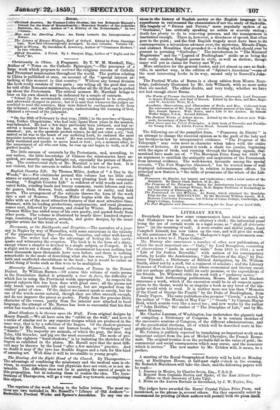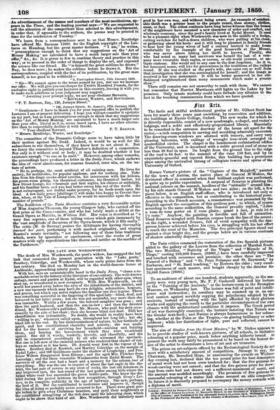LITERARY NEWS.
Everybody knows how some commentators have tried to make out that Shakspere was in youth an attorney's clerk; the inferential proof being the use of certain words in a legal sense, as " shall all determine here" (in the meaning of end). A more erudite and skilful judge, Lord Campbell himself, has now taken up the case, and will give the world, by the assistance of Mr. Murray, " Shakspere's legal acquirements con- sidered in a letter to J. Payne C011ier."
Mr. Murray also announces a number of other new publications, of which the most important are—" Italy," by Lord Broughton, consisting of observations "made in several visits" from 1816 to 1854; a new- " Life of Sir Joshua Reynolds," with notices of his contemporary artists, by Leslie the Academician; "the Glaciers of the Alps," by Pro- fessor Tyndall ; a Dictionary of Biblical Antiquities, by Dr. William Smith, aided not by a staff, but a regiment of scholars ; and the Literary Remains of Professor Jones, a man whose economical and literary career did not perhaps altogether fulfill its early promise, or the expectations of his friends. Dr. Whewell edits the work with a "prefatory notice." Among their forthcoming publications, Mesars. Hurst and Blackett announce a work, which if the execution could be in all respects appro. priate to the theme, would be as singular a book as any lover of the sin- gular would wish to read. It is neither more nor less than "Memoirs of the Court of George the Fourth" by the Duke of Buckingham, from Family Papers. The same publishers also promise "Creeds," a novel, by the author of "the Morals of May Fair" ; " Oceola " by Captain Mane Reid, which sounds very like a novel too ; and new works by the author of "John Halifax," the author of "The Discipline of Life," and by Mr. James Hannay.
Mr. Charles Lanman, of Washington, has undertaken the gigantic task of compiling a Dictionary of Congress. It is to contain sketches of the successive sessions of Congress, of the different administrations, and of the presidential elections, all of which will be described more in bio- graphical than in historical form. Mr. Cobden is publicly reported be translating an important work on an important subject from the pen of Michel Chevalier, the French Econo- mist. The original treatise is on the probable fall in the value of gold; the commercial and social consequences which may ensue: and the measures which it invites." The new matter by Mr. Cobden will, it seems, be a preface.
A meeting of the Royal Geographical Society will be held on Monday next, at Burlington House at half-past eight o'clock in the evening. Sir Roderick Murchison will take the chair, and the following papers will be read- 1. Journey in Mexico by Charles Sevin, Esq., F.R.G.S. 2. Reports from Captains Burton and Speke, of the East African Expe- dition on their discovery of Lake Ugyi.
3. Notes on the Aurora Borealis in Greenland, by J. W. Taylor, Esq.
The judges have awarded the Burns' Crystal Palace Prize Poem, and mentioned, as the phrase is, several others. Six they especially select to recommend for printing (if their authors will permit) with the poem itself. An advertisement of the names and numbers of the most meritorious ap- pears in the Times, and the leading journal says—" We are requested to call the attention of the competitors thus selected to this advertisement, in order that, if agreeable to the authors, the poems may be printed in time for the celebration of Tuesday."
We learn from a correspondence sent to us that Messrs. Routledge have offered Mr. Barnum 12001. for the English copyright of the Lec- tures on Humbug, but the great master declines. "I am," he writes, "presumptuous enough to think that my suggestions on the Art of Money Making' are calculated to have a much larger sale than your offer," &c., &c. It is given to few to combine theory and practice in this way ; or to proceed in the order of things to display the art, and expound the science like our friend. He " is himself the great sublime he draws." Nay, he does more ; he makes the sublime before he draws it. But the correspondence' coupled with the fact of its publication, by the great man
himself, is too good to be withheld— .
"2, Farringdon Street, 15th January 1859. "Sir—We cannot agree to the terms named by you, nor can we increase our offer. We will give you our cheque for Twelve Hundred Pounds, for the exclusive right to publish your Lectures in this country, leasing it with you to make such additions as your judgment may suggest.
"Awaiting your prompt reply, we are your obedient Servants,
" ROI:MU:WOE, WARNE, and Roonairioa. "P. T. Barnum, Esq., 126, Jermyn Street."
"1.26, Jermyn Street. Bt. James's, 17th January 1859.
" Gentlemen—I have to thank you for your repeated offer to publish the Lectures lam at present delivering. I hope you willnot consider it egotistic on my part, but as lace presumptuous enough to think that my suggestions on the Art of Money Making,' are calculated to have a much larger sale than your offer, liberal as it is' seems based upon, I have no other alterna- tive than to respectfully decline it with thanks.
"Your obedient Servant, P. T. Benxesi. "Messrs. Routledge, Warne, and Routledge."
The committee of the Dramatic College seem to have taken little by their motion against Mr. Dodd. Indeed, it would be as well for the subscribers to stir themselves, if they know how to set about it. But we fancy the committee is beyond Thurlow's definition of a corporation. Not only is it without soul or body; it may be doubted whether it has existence enough "to sue or be sued." However, among other remarks, the proceedings have produced a letter in the Dail; News which eschews the idea of rural almshouses, for reasons founded, inter Hews, on the na- ture of actors.
"He is, perhaps, the most artificial of all existing men. He lives for society, for multitudes, for popular applause, and for nothing else. Take him from his dingy smoke-dried taverns, his intercourse with his fellows, his green-room gossip, his theatrical costumier, his theatrical barber, his Bow Street lounge, his rehearsals and first nights his chimes at midnight, and his familiar faces, and you had better sweep him out of the world. He is not extravagant, nor fretful under poverty., for he feeds much upon the ideal. A few daily pence [shillings i] will make him happy in Covent Gar- den, when, at the Vale of Llangollen, he would be miserable upon the same number of pounds."
The feuilleton of the Paris Mon iteur contains a very favourable notice of Miss Augustus Thomson, the young Glasgow lady, who carried off the first prize at the Conservatoire, and who has lately made a debut at the Grand Opera as Matilda, in William Tell. Her voice is described as "a very fine soprano, one of those telling voices which gain immensely by the vast amplitude of the arena of the Opera-house, which it fills easily." The critic (M. de Rovray) praises the debAtante for having thoroughly learned her part, performing it with marked originality, and singing Rossini's music textually, "not following any of those false traditions which, sown by ignorance or carelessness, cover the works of great masters with ugly superfetations like thorns and nettles on the marbles of the Parthenon.'































 Previous page
Previous page